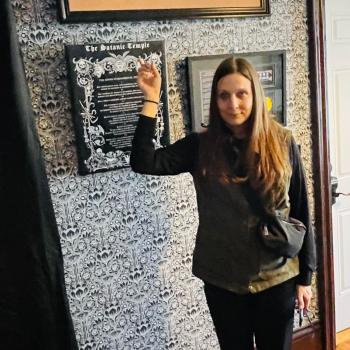Ordinances against fortune telling have a long history, from bans on sorcery and witchcraft in the Middle Ages and Early Modern Europe, embodied today in places like Saudi Arabia, to anti-fraud bans (often based in various ethnic prejudices) in the 19th century, to current laws that claim to be protecting citizens from fraud, but are often pushed by conservative Christian lawmakers. For generations those who practiced fortune-telling as a profession existed on the margins of society, usually depicted as mere swindlers preying on the gullible, until a new ethos started to emerge that classified divination as an art. Part of a spiritual and religious tradition that practitioners felt should be respected, and not subject to laws designed to outlaw those engaging in parlor tricks.
In the United States, many anti-fortune-telling laws have been challenged on the grounds of religious freedom, notably Z. Budapest’s very public 1975 battle against a California ordinance. More recently, Wiccans in places like Caspar, Wyoming, and Livingston Parish, Louisiana, succeeded in getting ordinances struck down on this basis. However, a much broader decision was handed down by the Maryland Court of Appeals in 2010, which ruled that fortune telling and related services are protected speech.
“Fortunetelling may be pure entertainment, it may give individuals some insight into the future or it may be hokum,” the Maryland Court of Appeals wrote in a 24-page opinion. “People who purchase fortunetelling services may or may not believe in its value. Fortunetellers may sometimes deceive their customers. We need not, however, pass judgment on the validity or the value of the speech that fortunetelling entails.”
This was something of a sea change in legal thinking on the issue, and soon challenges to fortune telling ordinances on the basis of free speech started to pop up in places like East Ridge, Tennessee. Advocacy group the First Amendment Center, lays out the constitutional rationale.
“…it’s important to note that most speech — whether it expresses my own impeccable logic or someone else’s silly belief — is protected from government control. Not just permitted. Or allowed. Or tolerated. But protected with the full force and vigor of an amendment to the United States Constitution.”
Now, we have another decision, announced yesterday, that bolsters the divination-as-free-speech line of thinking.
“A federal judge this week ruled that an Alexandria law forbidding fortunetellers from working in the city is a violation of First Amendment free speech rights. U.S. District Judge Dee D. Drell concurred with a recommendation in June by U.S. Magistrate Judge James D. Kirk that said Alexandria’s 2011 ban of Rachel Adams’ shop on Jackson Street Extension was unconstitutional.”
The ThinkProgress blog noted that Alexandria, Louisiana’s law banned “palmistry, card reading, fortune telling and other otherworldly communications,” with the city arguing that fortune-telling is “a fraud and inherently deceptive.” However, U.S. District Judge Dee D. Drell rejected that, noting that Louisiana has been able to survive and thrive while embracing psychics and fortune-tellers, especially in New Orleans.
As the legal framework for total bans start to crumble, many towns and cities have responded by passing strict regulations on the practice. In 2010 both Time Magazine and the BBC looked at a growing trend of stricter regulations against psychics being enforced by local governments. The creation of these subcultural “red light districts” are often harder to challenge than a total ban, though they often have the same effect. For example, in Chesterfield County, Virginia, zoning regulations for psychics are stricter than they are for strip clubs or pawn shops.
“In Chesterfield, businesses considered to be fortune-telling establishments must pay a $300 tax to get a business license, while nightclubs and adult businesses pay only a $100 tax for a license. Fortune-telling businesses must submit five references from the county to the police chief for approval. They are limited to one zoning designation – the same one reserved for adult businesses, scrap yards and pawn shops. And they must get a conditional-use permit for that zoning.”
Author and renowned tarot expert Mary K. Greer believes her business (reading cards) should be treated like any other business, and not singled out for punitive regulations. Quote: “It has been found that laws prohibiting fraud cover most cases of abuse perfectly adequately and far better than regulations that discriminate unfairly against this particular profession, especially when they assume criminal behavior where none has been shown by the individual. It has been proved over and over again that discriminatory regulations are created by special interest groups and that they are unfair and almost always unconstitutional.”
With yet another fortune-telling ban struck down on the basis of constitutionally protected free speech, regulations that try to zone such businesses out of existence are on increasingly shaky legal ground. The harsher the regulation, the more it seems like the local government is privileging one form of speech over another. It seems clear that whether you pay for it or not, whether you believe in it or not, “otherworldly communications” are protected speech. This is not just a good thing for free speech, but a good thing for the Pagans and esoteric practitioners who supplement their income by performing divination.















